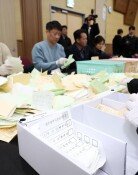Candidates blame each other in populist election
Candidates blame each other in populist election
Posted November. 09, 2021 07:14,
Updated November. 09, 2021 07:14
Lee Jae-myung, presidential candidate of the ruling Democratic Party of Korea, recently pointed out that excess tax revenue of this year is expected to reach 40 trillion won, commenting that it was unjust for people to live poorly in a rich nation. His comments are aimed to denounce his opponent Yoon Suk-yeol, who is against public relief funds. In response, Yoon said that he would invest 50 trillion won over the first 100 days after inauguration to compensate for self-employed’s loss under the government’s business restriction policy over the pandemic. Both Lee and Yoon are determined to invest massive amounts of tax once they are elected.
First, Lee’s claim that we have sufficient tax income exceeding 40 trillion won is not true. The government had to issue more than 100 trillion won alone this year in deficit-financing bonds. Moreover, 31 trillion won had been used up as supplementary budget. An additional 10 trillion won is expected to be collected, but this money needs to be used to redeem bonds and compensate losses for businesses that have not been able to get support so far. We would need at least 15 trillion to 20 trillion won if we were to pay out 300,000 to 500,000 won to everyone in the country, which would require issuing national bonds. “Poor people in a rich country” is nothing but a typical reasoning to advocate populism.
Yoon used to denounce Lee’s election campaign, saying, “malicious populism is stealing tax,” and he also referred to the presidential race as a “battle between rationalism and populism.” However, the main opposition candidate said in a recent media interview that he would inject public funds of 50 trillion won within 100 days of taking office to fully compensate for losses due to the pandemic. It remains unknown how he will raise the money, which needs to be financed, be it in bonds issuance. He promises to categorize the compensation policy and pay out according to principle, but he does not state how the money will be raised. Yoon promising to spend trillions of won without considering national deficit situation is no different from Lee.
Korea’s national deficits is expected to exceed 1,000 trillion won next year and 2,000 trillion won in 2029, based on statistics by the Bureau of the National Assembly’s national budget policy. A recent OECD report says that Korea’s annual potential growth for 2030-2060 is only 0.8%, the lowest among the member states. Among the 35 advanced economies based on the International Monetary Fund definition, Korea will have the fastest growing national debt for the next five years, according to a report by the IMF. What is the fate of a country with the lowest growth and highest debt increase? Will the presidential hopefuls continue to disregard the dismal future and argue to spend more tax?







